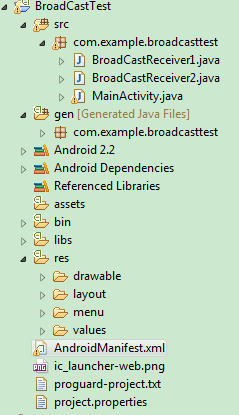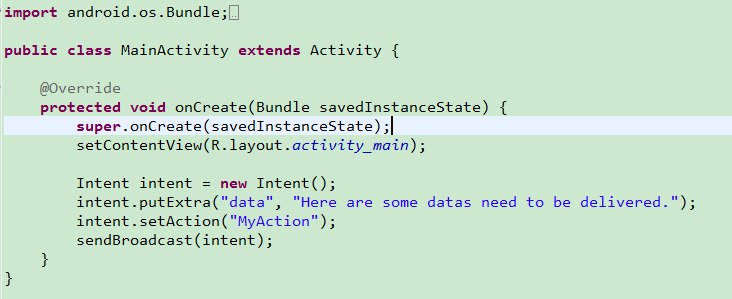如总体的下图:

接下来是贴代码了:
package com.example.broadcasttest;
import android.content.BroadcastReceiver;
import android.content.Context;
import android.content.Intent;
import android.util.Log;
public class BroadCastReceiver1 extends BroadcastReceiver {
@Override
public void onReceive(Context arg0, Intent arg1) {
// TODO Auto-generated method stub
Log.v("Show_V", "I am Receiver-1 !");
}
}
package com.example.broadcasttest;
import android.content.BroadcastReceiver;
import android.content.Context;
import android.content.Intent;
import android.util.Log;
public class BroadCastReceiver2 extends BroadcastReceiver {
@Override
public void onReceive(Context context, Intent intent) {
// TODO Auto-generated method stub
Log.v("Show_V", "I am Receiver-2 !");
}
}
package com.example.broadcasttest;
import android.os.Bundle;
import android.app.Activity;
import android.content.Intent;
import android.view.Menu;
public class MainActivity extends Activity {
@Override
protected void onCreate(Bundle savedInstanceState) {
super.onCreate(savedInstanceState);
setContentView(R.layout.activity_main);
Intent intent = new Intent();
intent.setAction("MyAction");
sendBroadcast(intent);
}
}
<?xml version="1.0" encoding="utf-8"?>
<manifest xmlns:android="http://schemas.android.com/apk/res/android"
package="com.example.broadcasttest"
android:versionCode="1"
android:versionName="1.0" >
<uses-sdk
android:minSdkVersion="8"
android:targetSdkVersion="16" />
<application
android:allowBackup="true"
android:icon="@drawable/ic_launcher"
android:label="@string/app_name"
android:theme="@style/AppTheme" >
<activity
android:name="com.example.broadcasttest.MainActivity"
android:label="@string/app_name" >
<intent-filter>
<action android:name="android.intent.action.MAIN" />
<category android:name="android.intent.category.LAUNCHER" />
</intent-filter>
</activity>
<receiver android:name=".BroadCastReceiver1" >
<intent-filter>
<action android:name="MyAction" />
</intent-filter>
</receiver>
<receiver android:name=".BroadCastReceiver2" >
<intent-filter>
<action android:name="MyAction" />
</intent-filter>
</receiver>
</application>
</manifest>
代码的基本机理是:
通过Manifest文件注册了2个Receiver对象,并在<intent-filter>标签对里面对消息进行了过滤,意思是:当前注册的Receiver对象只对我定义的消息类型进行相应,也就是:MyAction。
其中我对这两个Receiver都进行了消息过滤,也就是只监听MyAction这个消息。再看BroadCastReceiver1,里面的代码实现很简单,就是简单的继承了BroadcastReceiver这个父类,然后实现未实现的方法onReceiver()就可以了。程序运行以后的结果是:

其中还有需要进一步用代码来验证的东西,也就是谁会先接受到这个intent发送过来的消息呢,我们对广播的接收顺序并没有设置什么,其实我通过调整Manifest文件里面的广播注册顺序,运行结果的接收顺序就改变了。通过扩展,我们可以进一步对intent来做功能,比如发送一定的数据给广播,通过intent.putExtra();来实现,在然后再在广播的onReceiver()方法里面对收到的intent来进行提取消息,也就是intent.getXXXExtra();XXX是你想提取的类型。
这样我们就实现了多个Receiver来接收同一个消息的方法。

